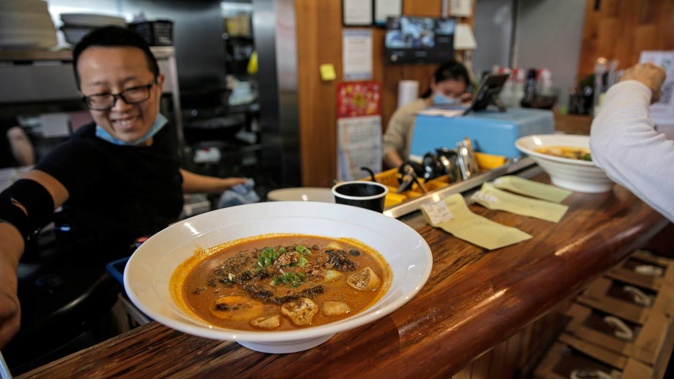
More than eight in 10 restaurant businesses are understaffed and 62 per cent of eateries had to temporarily close in August due to staffing challenges, a Restaurant Association survey has found.
Immigration Minister Michael Woodhouse announced on Sunday that the qualification requirement to hire migrant chefs would be removed to make it easier for hospitality employers to get staff.
He also confirmed that exemption to the median wage threshold has also been extended for another year. Employers will be able to pay migrant workers 95 per cent of the median wage or $28.18 per hour in April 2023, then will move to 100 per cent of the median wage in April 2024.
Association chief executive Marisa Bidois said the relaxation of rules were in the right direction, but there was a need for long-term strategy for immigration policy that supports business growth.
She said staff shortages are hampering the reopening of the hospitality industry.
/cloudfront-ap-southeast-2.images.arcpublishing.com/nzme/VMN7RKR4TFZ2Z4QH5KJCJI5QFU.jpg) Eight in 10 restaurant businesses are currently understaffed, the Restaurant Association says. Photo / Babiche Martens.
Eight in 10 restaurant businesses are currently understaffed, the Restaurant Association says. Photo / Babiche Martens.
A recent poll done by the association found 65 per cent of its 120 members employed fewer than 20 people, yet 83 per cent said their business was currently understaffed. Of those members, the estimate was that they were between 37 and 90 per cent understaffed.
Six in 10 businesses are projecting they will need to hire up to five additional staff in the coming months, with another 23 per cent needing between six to 10 extra people.
Bidois said the industry was experiencing a shortage of mid to senior hospitality roles such as head and sous chefs, restaurant and cafe managers.
"These specific shortages mean businesses are having to close in one way or another, at best a temporary closure or reduction in trading hours ... at worst a winding up of the business," she said.
- Economist: Businesses can't find quality or quantity of staff amid labour shortage
- Beyond Recruitment: Temp workers the big winners from labour shortage
- Hospo worker staff crunch: Make jobs better, Immigration Minister says
"This also impacts our business as they hold off any expansion plans they may have had which in turn impacts the growth of our sector overall."
At one Newmarket eatery that has been running for 16 years, Selera Malaysian Restaurant, the staff shortage has forced it to stop serving a la carte sharing dishes - and keeping its menu to just street food offerings and satay.
/cloudfront-ap-southeast-2.images.arcpublishing.com/nzme/76S2N4NXQ5MO4YNDBMB55PG3UE.jpg) Marisa Bidois, CEO of the Restaurant Association. Photo / Supplied
Marisa Bidois, CEO of the Restaurant Association. Photo / Supplied
Owner Miki Ong said she hoped the changes would help her pull through until the staffing issue gets better.
Bidois said the hospitality industry was in desperate need of employees in an environment of low employment, and that it was important to be able to access the talent needed.
Recent data also showed the pace of recovery, with 79 per cent of the industry saying revenue is the same or higher against the same time last year.
"Average revenue growth of 60 per cent is significant, but it could be greater - 62 per cent of members temporarily closed in August because of ongoing staffing challenges," Bidois said.
"Lowering level 4 is a step in the right direction ... there is more that can be done, though, and we look forward to working with Government to achieve a short-term and long-term strategy that will support the hospitality industry."
She said immigration plays a significant role in bolstering the hospitality sector's workforce.
"We need clear guidance from the Government on its short, medium and long-term plans for immigration and the role it sees immigration plays in the country's economic recovery," Bidois said.
The association supported the Productivity Commission's recommendations for the Government to publish a policy statement to clarify how immigration will be managed and connected to other Government objectives.
It also said there needed to be stronger links with education and training policies, and the provision of additional funding for the Labour inspectorate to support Labour market regulation, the accreditation scheme and the integrity of our immigration system.
Bidois said immigration policy needs to match business needs.
"A trickle of international tourists back to New Zealand does not provide the increased workforce and security that small businesses need to plan for their long-term recovery," Bidois said.
"These international visitors expect a certain level of hospitality - in all senses of the word - when they visit New Zealand, and that is something our sector cannot provide without Government support to fill the immediate skills shortages we are experiencing."
Take your Radio, Podcasts and Music with you









